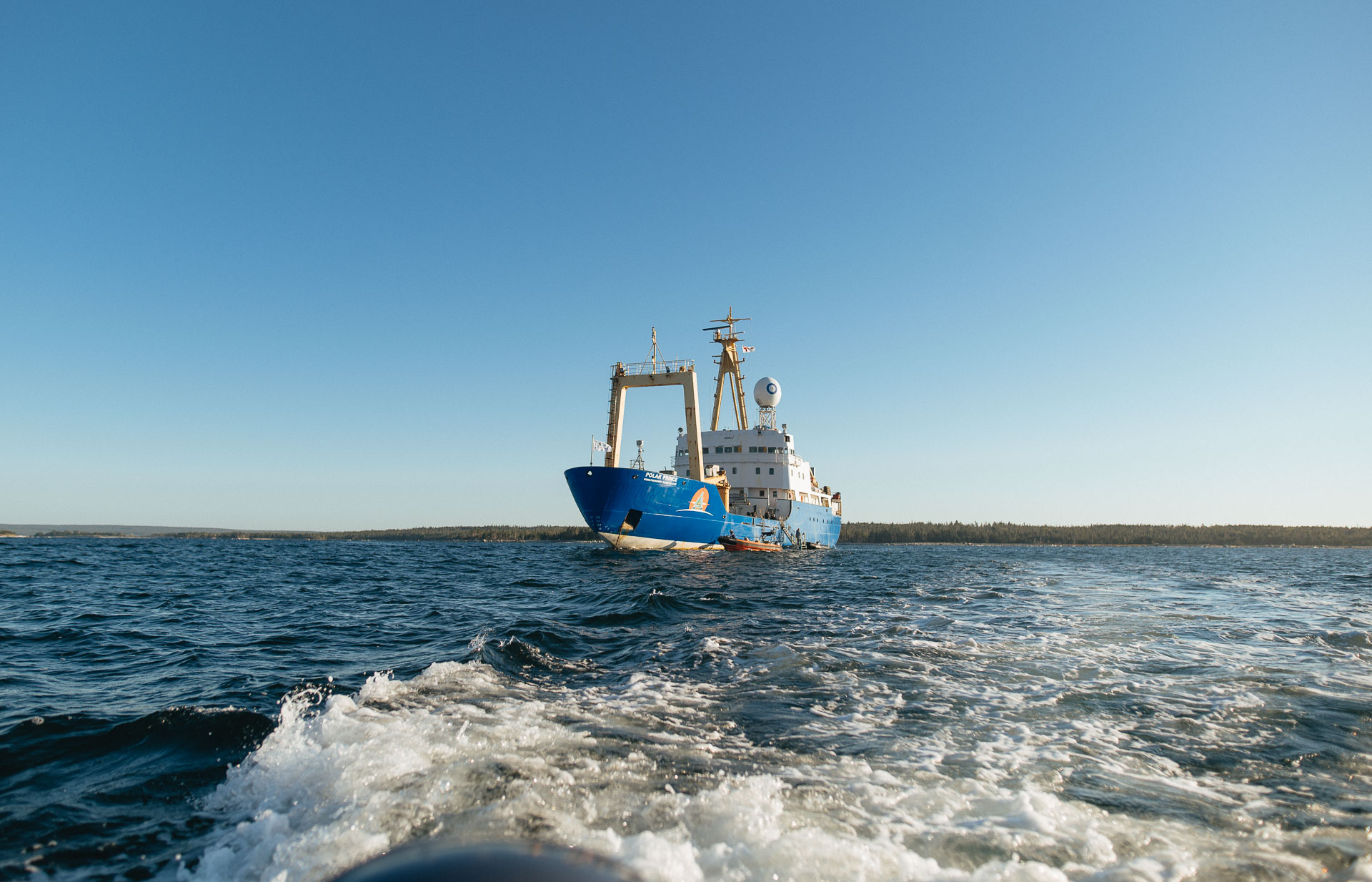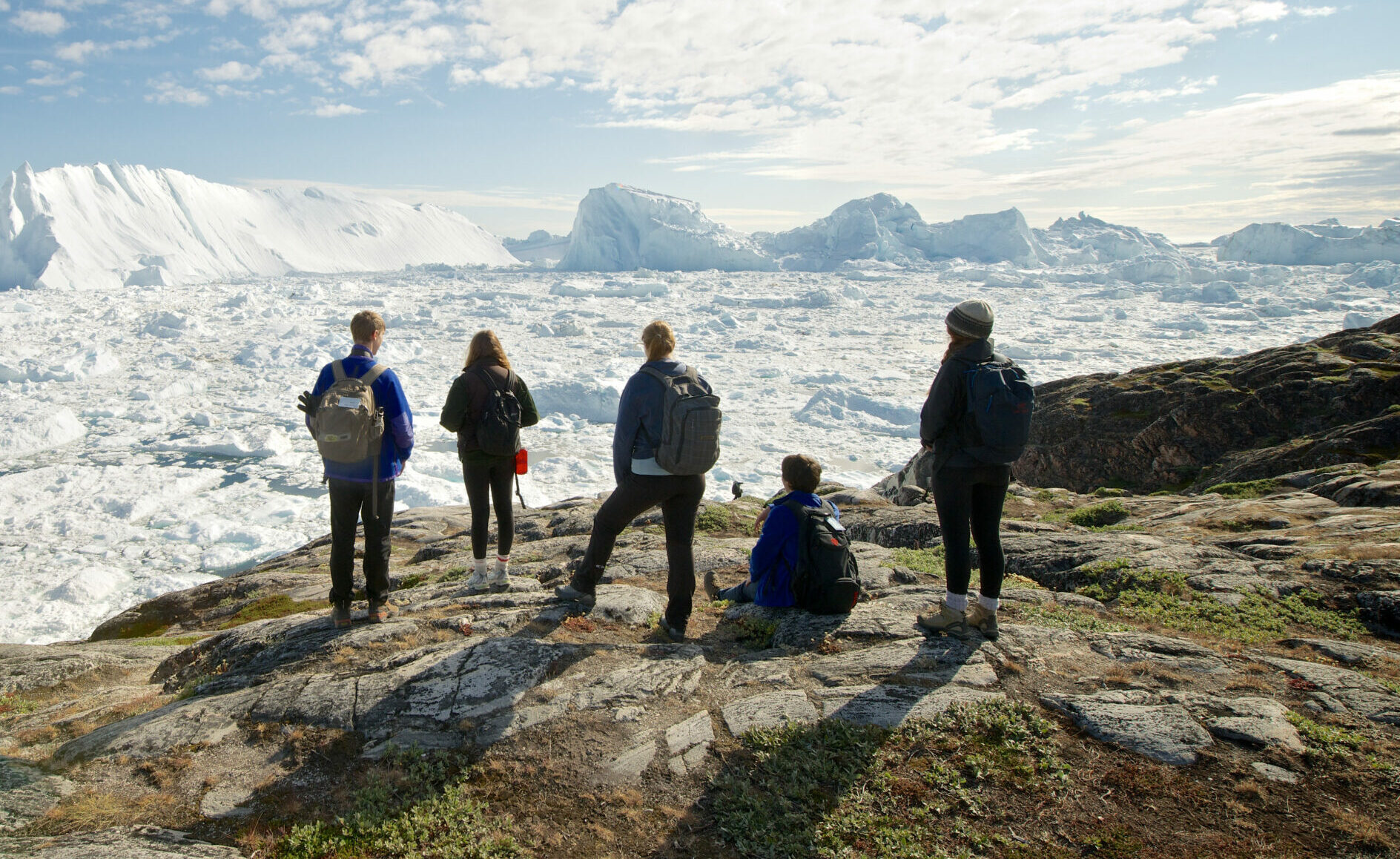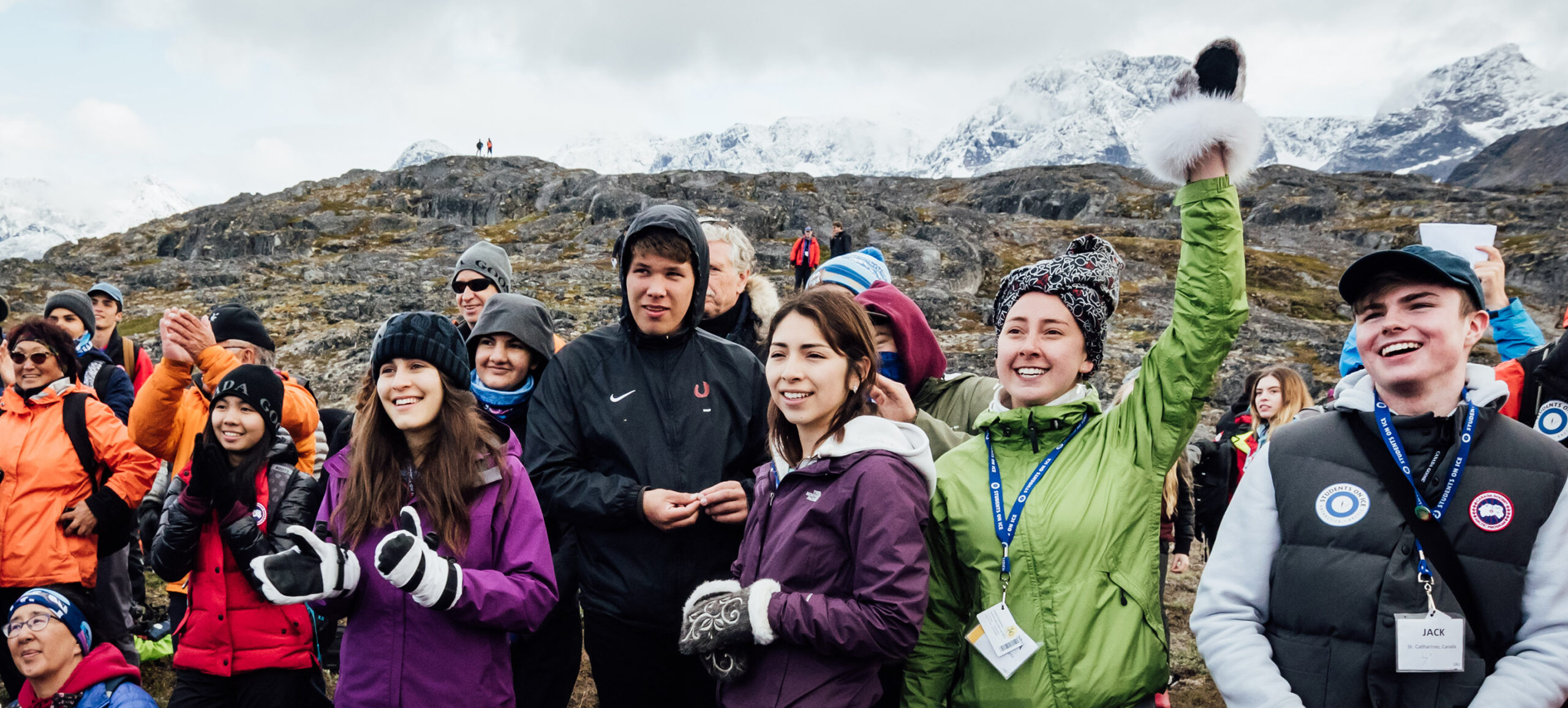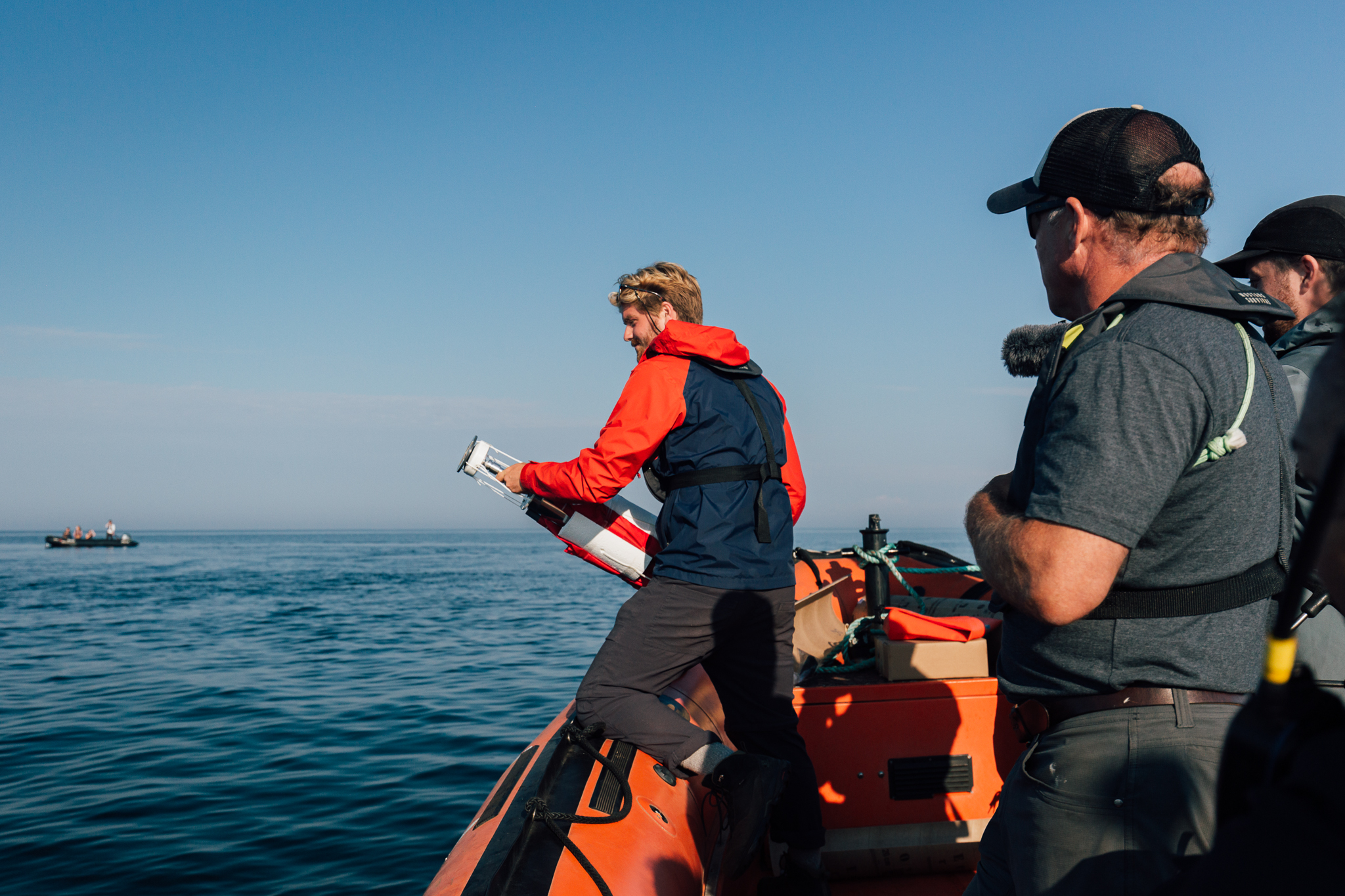2024 Innu Nation Uinipekᵁ Expedition: Full Recap
Innu Nation Uinipeku Expedition 2024: A Journey of Shared Knowledge and Stewardship
The 2024 Innu Nation Uinipeku Expedition was a transformative journey, blending traditional Innu knowledge with contemporary marine science to inform Innu decisions about the Innu marine zones and to give youth hands-on experiences and equip them with the skills and knowledge to inspire future pursuits in marine and land stewardship in their territory.
The 2024 expedition significantly enhanced the data Innu Nation has collected in its marine areas, supporting its Marine Monitoring and Stewardship Project. Its goal is to increase understanding of Innu marine environments, support effective collaboration with partners, and build capacities within Innu communities to support and participate in this work. The journey’s extensive data collection efforts also allowed Innu Nation to introduce Innu youth to a variety of research methods in their waters.

Data Collection for Informed Stewardship
Participants learned a variety of data collection techniques working alongside staff from Innu Marine, Fisheries and Oceans Canada (DFO), Canada Wildlife Service, Huntsman Marine Science Centre, and the Canadian Museum of Nature. These activities included underwater surveys using remote-operated submarine vehicles (ROVs) and baited drop cameras, water sampling, CTD casts, grab sampling, and oceanographic drifter deployment. They also participated in habitat mapping, identified marine species, conducted plankton tows, and analyzed microscopic aquatic life. These hands-on experiences provided an introduction to certain marine research methods and their applications.
Through all of these different research methods, the team gathered important data that provides insight into marine biodiversity, water quality and characterization, and ecosystem health, allowing Innu Nation to track changes to the marine environment over time.
“The purpose of this expedition is not just to gather data but to use Western science as a tool to further enhance and validate Innu knowledge. This approach allows Innu Nation to govern their marine environment in a way that honors Innu culture and ancestors,” said Uinipeku Expedition Project Lead, Michael Hannaford.

Integrating Traditional Knowledge and Western Science
The 2024 Uinipeku Expedition adopted a unique model of knowledge gathering, combining Innu traditional knowledge with modern scientific methods in a way that few other projects in Canada have. This innovative approach not only enriched the scientific data collected but also ensured that Innu Nation’s deep-rooted connection with their land and waters was central to the research process.
“It provides a really good model for how Western science and Indigenous communities can collaborate on research questions that are really relevant and important to Indigenous communities,” said Roger Bull, Head of Operations at the National Biodiversity Cryobank of Canada.
The expedition’s approach involved identifying key sites for data collection based on the observations and experiences of Innu Elders and Guardians. These locations, known for their ecological and cultural significance, became focal points for scientific study. The collaboration allowed for a more meaningful understanding of the marine ecosystem, one that respects and incorporates generations of Innu knowledge.
“By grounding our data collection sites in traditional Innu knowledge, we’re ensuring that the scientific research we conduct is deeply informed by generations of understanding and experience,” Michael explained. “But this isn’t about choosing Western science over Innu knowledge or vice versa; it’s about bringing them together to protect Innu nationhood and ensure the lands and waters are managed well for future generations.”
Dr. Claire Goodwin, a marine biologist from Huntsman Marine Science Centre, highlighted the significance of this partnership: “Working alongside the Innu community has opened up new perspectives on marine research. The knowledge they bring to the table is invaluable, and it challenges us as scientists to think more holistically about the environment.”

Empowering Through Education and Knowledge
This synthesis of knowledge was not a one-way street. The scientific findings from the expedition will be shared with the community, allowing for a continuous exchange of ideas and practices. Innu youth, in particular, are at the forefront of this exchange. Their enthusiasm and dedication to learning research methodologies and understanding their importance in marine monitoring efforts were truly inspiring.
“It’s been a really good opportunity to be a part of this because I know that my ancestors would want us here to learn about their past on the land,” one participant said. “It holds a lot of memories and emotions. Just being on the land, you can feel their energy even though they’re not here anymore. You can feel their survival, their joy, and their hardships, you know? It’s a good feeling. And it’s something that I’m so eager to learn more about.”
“The land and water are a platform for sharing Innu ways of life and culture,” Innu Parks Superintendent Jack Penashue said to youth onboard the expedition vessel, MV Polar Prince. “That’s what we’re doing now on this expedition and you’re part of that. You’re important contributors.”
By blending the two knowledge systems, the expedition created a dynamic learning environment where Innu youth could see their cultural heritage infused into contemporary scientific approaches. Meantime, marine researchers, technicians, educators, and the ship’s crew were exposed to Innu culture, knowledge, and history. This integration not only enhanced the scientific approach during the expedition but also empowered the youth by highlighting the importance of their cultural identity in environmental stewardship.
“I feel like I’ve really grown from the experience,” said one youth. “I’ve definitely seen how everything interacts with each other, like the science and the Guardians and the history of the land. It all connects. And it’s been really, really fun and eye-opening as well.”
“It’s pretty awesome being able to bring together researchers from all over Canada, Innu Guardians, community members to kind of create a better picture of what our marine zone looks like, while also being able to include youth in it,” said Loreena Kuijper-Andrew, who joined the 2024 expedition as an alumni and now works as a Marine Programs Coordinator with Innu Nation.
The expedition also encouraged and inspired many to consider careers in the marine sector, sowing the seeds for a new generation of Innu leaders who can advocate for their community and the preservation of their marine environment.
“To have youth come and work with people that have this real passion about what they do, it helps young people to understand what’s out there, what opportunities they have in the world, and what skills they can develop and then bring back to their Nation,” said Innu Parks Lead Planner, Gioia Montevecchi.
“This is a stepping stone for them to better educate themselves, not just within the Innu culture, but also within the Western culture as well. If you learn from both cultures, it makes you much, much stronger, able to adapt, and to educate other people,” Jack said.

Key Learning Outcomes
The learning outcomes from the expedition are multifaceted, reflecting both the scientific and cultural enrichment of the participants. These outcomes include:
- Enhanced Scientific Skills: Participants gained hands-on experience in various scientific data collection techniques, including underwater surveys, water sampling, grab sampling, and data recording. These skills are crucial for ongoing and future marine monitoring efforts.
- Environmental Awareness: By integrating Innu traditional knowledge with modern scientific methods, the expedition deepened participants’ understanding of the Innu marine zones. Elders and youth provided invaluable insights into the historical and cultural significance of key sites, while scientists introduced advanced techniques to assess ecosystem health. This combined approach revealed a comprehensive view of the marine ecosystem’s interconnectedness, fostering an awareness that is essential for informed and effective stewardship practices within the community.
- Cultural Integration: By valuing and incorporating traditional knowledge, participants developed a holistic view of marine stewardship that respects and honours cultural heritage. This integration ensures that any conservation efforts are culturally relevant and sustainable.
- Community Engagement: From youth and Elders to Guardians and leaders, the involvement of various community members strengthened communal bonds and reinforced collective stewardship efforts.
- Strengthened Collaboration and Partnerships: The expedition fostered stronger partnerships among diverse groups, including researchers, community members, and youth, creating a cohesive network dedicated to advancing marine stewardship and shared learning.

A Path Forward
The success of the 2024 Uinipeku Expedition underscores the importance of collaborative efforts in environmental education and stewardship. By actively including Innu youth in the Marine Monitoring and Stewardship Project, the Innu Nation is ensuring a sustainable future for their marine environment. The learning outcomes and data collected are not only beneficial for immediate efforts but also serve as an educational tool for future generations.
“I feel grateful. I’m really thankful to the Innu Nation and the SOI team,” another youth said. “I hope they continue doing this for the future generations so they can learn about the water and where we came from.”
The data collected during this expedition will serve as the growing foundation for the Innu Nation’s Marine Monitoring and Stewardship Project. By identifying areas of high marine biodiversity and ecosystem health, the community can track changes over time and make informed decisions to protect their marine resources.
But this expedition is more than just a journey; it’s a testament to the Innu Nation’s commitment to Nitassinan (Innu homeland) – and the future of its Nation.
“We are building a legacy of stewardship and resilience that will empower our people and protect our environment for generations to come,” Jack said.





